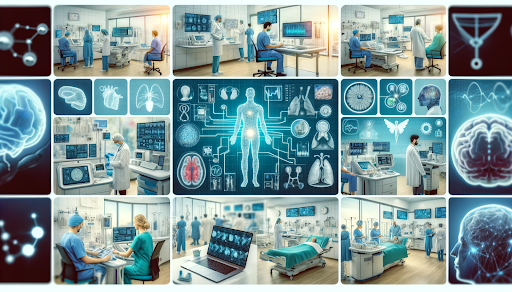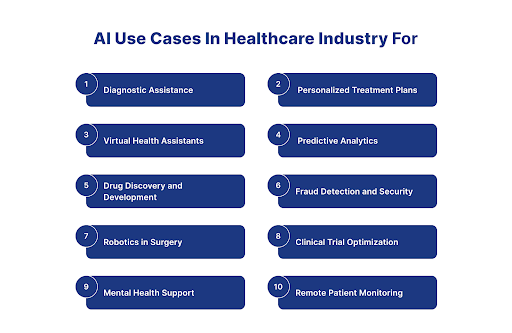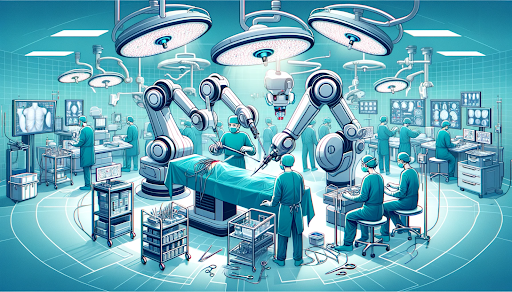10 AI Use Cases in Healthcare Industry Transforming Care
Introduction

- Artificial intelligence, or AI, has caused significant disruptions in several industries in recent years, and the healthcare industry is one where its effects are most noticeable. AI technology integration in healthcare offers several advantages, from improved diagnosis to individualized treatment regimens. Let's examine a few fascinating application Ai use cases in healthcare industry.
AI use cases in healthcare industr

1.AI Use Cases In Healthcare Industry For Diagnostic Assistance
-
AI systems are quite good at deciphering complicated medical data, including scans and pictures. AI in radiology helps medical practitioners by rapidly and precisely identifying abnormalities in CT, MRI, and X-ray images. This increases the accuracy of detecting health concerns while also speeding up the diagnostic procedure.
-
An AI-powered radiography software, Aidoc, helps radiologists identify anomalies and rank the most important cases. This guarantees that life-threatening illnesses are treated immediately while speeding up the diagnostic procedure.
2.AI Use Cases In Healthcare Industry For Personalized Treatment Plans
-
AI enables medical professionals to customize treatment regimens based on unique patient information. Machine learning algorithms examine lifestyle variables, genetic data, and patient histories to suggest tailored treatments. By taking into account the individual features of every patient, this strategy not only maximizes the benefits of treatment but also reduces its unwanted effects.
-
One excellent example is IBM Watson for Oncology, which analyses clinical trial data, patient information, and medical literature to provide oncologists with suggestions for evidence-based treatment. This enables doctors to choose the most appropriate and individualized medicine course for cancer patients with more excellent knowledge.
3.AI Use Cases In Healthcare Industry For Virtual Health Assistants
-
Virtual assistants and chatbots driven by AI are changing patient care involvement. These systems monitor patients' vital signs, give prescription reminders, and respond to inquiries instantly and around the clock. Virtual health assistants facilitate communication between patients and healthcare professionals and improve accessibility to patient treatment.
-
For example, customers may evaluate their symptoms, get medical advice, and even schedule appointments with healthcare providers using Babylon Health's AI-powered chatbot. This enhances patient education while contributing to more effective use of healthcare resources.
4.AI Use Cases In Healthcare Industry For Predictive Analytics
-
Healthcare organizations can foresee disease outbreaks, patient admission rates, and even the possibility of certain medical disorders using AI-powered predictive analytics. AI supports proactive healthcare management by analyzing large databases, which enables resource optimization and prompt actions.
-
For example, DeepMind at Google created an artificial intelligence system that uses patient record analysis to forecast the likelihood of acute kidney damage. Because of this, medical professionals may take action early on, saving lives and lessening the strain on available resources.
5.AI Use Cases In Healthcare Industry For Drug Discovery and Development
-
Artificial intelligence speeds up the drug discovery process by sifting through enormous databases to find promising drug candidates. Models of machine learning have the ability to greatly reduce the time and costs involved in bringing novel medications to market by predicting the efficacy and possible adverse effects of new treatments.
-
For example, Atomwise uses AI algorithms to anticipate possible drugs by analyzing molecule structures. This method opens up new possibilities for creating cutting-edge treatments by quickly identifying promising molecules.
6.AI Use Cases In Healthcare Industry For Fraud Detection and Security
-
Artificial intelligence enhances healthcare cybersecurity by identifying and averting fraud and security breaches. To guarantee the privacy and accuracy of medical records, machine learning algorithms examine trends in healthcare data to spot abnormalities that can point to fraud.
-
Healthcare services provider Optum360 uses AI algorithms to spot anomalies in claims and billing, lowering fraud and boosting the effectiveness of healthcare administration.
7.AI Use Cases In Healthcare Industry For Robotics in Surgery
- Robotic equipment with AI capabilities helps surgeons execute precise, complicated surgery. Patients recover more quickly from these devices because they offer real-time feedback, improving the surgeon's skills and lessening the invasiveness of treatments.

- The da Vinci Surgical System, a ground-breaking robotic platform created by Intuitive Surgical, is one example. This technology enables surgeons to carry out intricate procedures with improved dexterity and precision through tiny incisions. A high-definition camera and instrumentation are mounted to the robotic arms to provide a three-dimensional surgical site image. Surgeons control the robotic arms from a console, transferring their precise motions into actions within the patient's body.
8.AI Use Cases In Healthcare Industry For Clinical Trial Optimization
-
AI streamlines clinical trial procedures through the identification of qualified participants, trial design optimization, and risk and result prediction. This quickens the process of creating novel cures and treatments.
-
Medidata, a business at the forefront of innovative clinical trial design, is one such example. Medidata's platform makes the clinical trial procedure moreeffective, using artificial intelligence and machine learning for everything from patient recruiting to data analysis. The tool helps investigators find eligible subjects more quickly, choose trial sites optimally, and anticipate difficulties. Medidata increases the effectiveness of clinical trials, lowers costs, and shortens the time it takes to get novel treatments to the market by using real-time data and analytics.
9.AI Use Cases In Healthcare Industry For Mental Health Support
-
Chatbots and artificial intelligence (AI)-powered apps can help with mental health assistance by tracking mood trends, giving individualized coping techniques, and facilitating prompt interventions. This enhances people's overall sense of well-being.
-
An example of this revolutionary strategy is Woebot, a cutting-edge chatbot for mental health created by psychologists and AI specialists. Woebot uses conversational therapies grounded in cognitive-behavioral therapy (CBT) principles. Woebot offers psychoeducation, coping mechanisms, and emotional support through consistent encounters. Users of this AI-powered, real-time mental health help have a quick, private way to communicate their feelings.
10.AI Use Cases In Healthcare Industry For Remote Patient Monitoring
-
AI enables continuous monitoring of patients in their homes, gathering data on vital signs and other health indicators in real-time. In particular, this proactive strategy enables healthcare practitioners to react swiftly and avert consequences for patients with chronic diseases.
-
One prominent illustration is Current Health's platform, which blends wearable technology with AI-powered analytics to provide ongoing patient monitoring. The wearable medical gadgets from Current Health monitor vital indicators like heart and breathing rates and provide data to healthcare specialists in real-time. This makes it possible for medical professionals to keep an eye on patients who are recuperating from surgery or chronic illnesses from a distance, enabling them to identify any worrying patterns early and take appropriate action.
Conclusion
- In conclusion, the application of AI in healthcare represents a paradigm change in how we see patient care and medical research. AI is a potent ally in improving healthcare results, from bettering diagnosis to tailored therapies, robots in surgery, mental health assistance, and beyond. As these creative use cases develop further, the future seems promising for a more effective, patient-centered, and technologically sophisticated healthcare environment.
How Digiqt will help you adapt AI in your company
-
At Digiqt, we are dedicated to assisting companies in automating critical processes. Our highly skilled and professional team ensures the timely development and delivery of AI software. We commence by thoroughly understanding our client's specific requirements, and based on these requirements, our proficient team develops the AI software. Furthermore, we provide our clients with monthly updates on the software development progress.
-
Digiqt's commitment to automation, client-centric software development, and regular updates ensures efficiency and effectiveness in streamlining insurance operations.
Contact Us
Frequently Asked Questions
What are 10 AI Use Cases in Healthcare Industry Transforming Care?
10 AI Use Cases in Healthcare Industry Transforming Care are AI-powered systems that automate and optimize processes using machine learning, natural language processing, and intelligent decision-making capabilities.
How do 10 AI Use Cases in Healthcare Industry Transforming Care work?
10 AI Use Cases in Healthcare Industry Transforming Care work by analyzing data, learning patterns, and executing tasks autonomously while integrating with existing systems to streamline operations and improve efficiency.
What are the benefits of using 10 AI Use Cases in Healthcare Industry Transforming Care?
The benefits include increased efficiency, reduced operational costs, improved accuracy, 24/7 availability, better customer experience, and data-driven insights for decision-making.


















